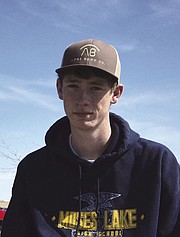Tanner Pugh Benefits From NILE Merit Heifer Program
“Pretty awesome to get the chance,” Tanner Pugh says. “It’s a great opportunity.”
Pugh, a 16-year-old sophomore at Moses Lake High School is one of a few youth in Washington State selected to receive a calf from the NILE Merit Heifer Program in Montana. The heifer came to Pugh as a weanling last November and he will raise it until the NILE show in October.
During this time, there is joint ownership between Pugh and the NILE program. After the NILE show, he will take full possession of the heifer and any of its offspring.
The purpose of the heifer program is, according to Pugh, to encourage youth to enter the cattle business to keep it going. “It’s hard to start,” Pugh says, noting it takes a lot of money. For that reason the heifers are not sold at the NILE show, but are intended to help start a herd.
Pugh’s family lives just outside of Moses Lake. His parents are Hellen and Mike Pugh, and the family has about three acres of land. Pugh has a herd of six cattle, including the NILE heifer, that he cares for and shows. Raising cattle and showing is a family tradition, he says, as his grandmother and parents all showed and that’s how he got interested. “I just started showing and it took off from there.” Pugh has had some success, earning Grand Champion at both the Grant County and Adams County Fairs.
To apply for the NILE heifer, Pugh had to write an essay about why he should win the heifer, his past experiences with cattle, and what he hoped to get out of the program. He also had to do a video showing his facilities, current FFA projects, and his goals and objectives if he were to be awarded a heifer. He also had to get six references. Three were put on the application so the selection committee could call them, and three had to write letters of recommendation for Pugh. Pugh says a friend of his applied and wasn’t selected, so Pugh was surprised when he was.
Different cattle companies in Montana donate the animals for the program. Pugh traveled to the Shipwheel Cattle Company in Chinook, Montana, to pick up the heifer. There were two heifers there from which he could choose, and he also got to see the company’s operation while he was there.
The responsibility of the NILE heifer is just more that adds to what he does to show cattle already. But he tries to keep this calf extra prepared because he feels he’s an ambassador for the NILE program. Still, it’s a “bunch” of work, he says. He tries to work with the cattle once a day, walking them and cleaning them. “You make time. It’s just another priority. It doesn’t make that much money. I do it because I like cows and the cattle business,” he says. Because of the NILE program, he says he meets “a lot of cool people.” The NILE show in October has people come from all over the country, he explains.
Bill Pelton, Program Chairman of the NILE Merit Heifer Program, says the program has been very successful. “Not one-hundred percent go into the industry but those that do appreciate the support.” According to Pelton, twenty-five merit heifers are awarded each year and the program usually gets around fifty applications. The program has been going since 2003, Pelton says, and it “helps kids start in the cattle industry and learn what it takes to be in the cattle industry.” Pelton says that the “kids who apply are the lifeblood of the industry” and they look for youth who are in or around cattle for the program. “Virtually all” participants have been successful, he adds, and many go into the cattle industry.
Pugh plans to breed his calf in May or June so she’ll calve in March. He’ll either show the calf if it’s “good enough” or sell it. Pugh hopes to move to Montana someday and be a cattle rancher. He is looking at going to college for Agribusiness and is looking at either Oklahoma State University or Montana State.
“People in big cities think food comes from the grocery store,” Pugh says. He explains that everyone should know about agriculture. “You don’t have to work in it, just understand it” because it “plays such a large role in everyone’s life and I don’t think they understand it.”
In the future, Pugh says there will be more technology in agriculture such as GPS. And he thinks there will be larger yields from better varieties. But also, he adds, there will be more corporate farms and fewer family operations.
In his spare time, Pugh likes to go hunting and fishing. He has hunted elk, deer, coyotes, and “a lot of waterfowl.” He took an elk this past season.
“NILE,” which stands for “Northern International Livestock Exposition,” awards heifers to kids from age 12 to 16 based on “the basis of merit, future goals and ability to care for the animal” according to their website. Since Pugh is now 16, this was the last year he could apply.
“If anyone’s interested,” Pugh says, “get on the NILE website and turn in your application. It’s a great way to get started.”
“It’s a very commendable program,” Pelton adds. “It’s not a program of charity, but of merit.”





